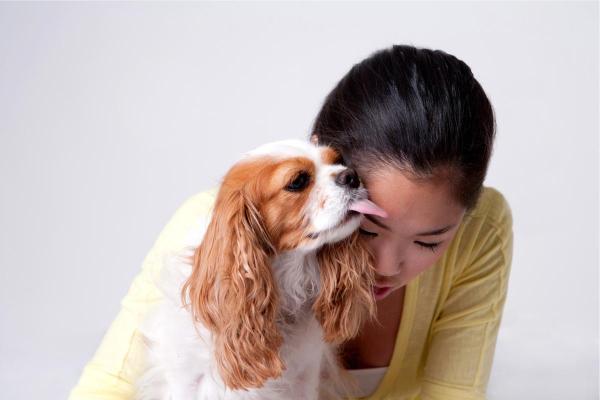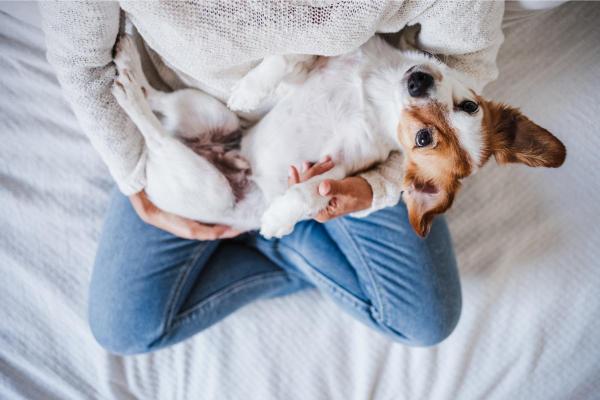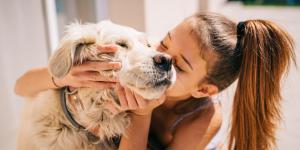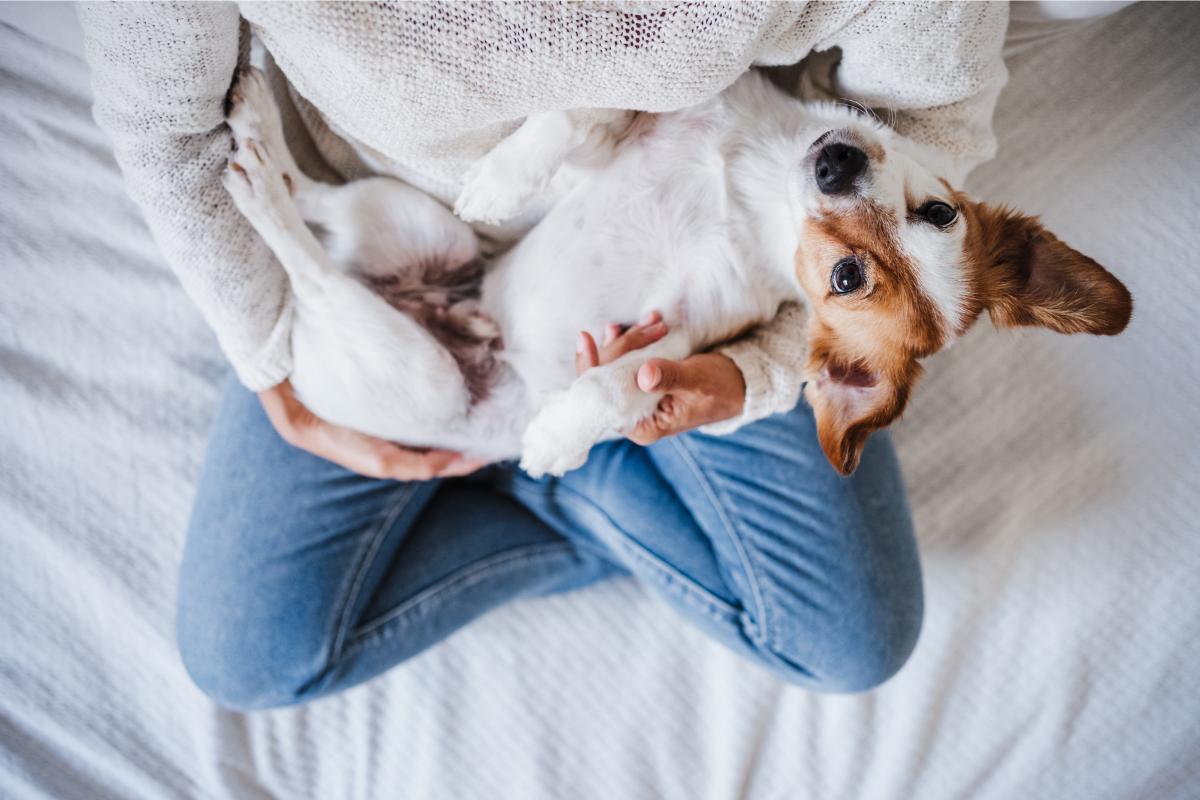Do Dogs Think Humans Are Their Parents?



See files for Dogs
Many dog guardians call themselves ‘dog parents’, even referring to their furry companions as ‘fur babies’ or similar. It is understandable we think of ourselves in a parental role when it comes to our dogs. Not only do we provide all of their basic needs and offer them protection, but they look to us as a point of reference for what they should and shouldn't do. Not all dogs will have the same relationship with their guardians. This can depend on the dog's individual personality and their experiences, as well as the circumstances of their adoption. For example, adopting an adult dog may lead to a different relationship to adopting a puppy.
AnimalWised looks closer at the relationship between a dog and their human guardians by asking do dogs think humans are their parents? By looking at the cognitive ability of dogs and how they relate to us, we find out how do dogs see humans.
Do dogs recognize their own mother?
Some guardians wonder whether their dog has a good memory. We know they can remember where they left certain toys, where the dog food is kept and other basic daily occurrences. They also are able to learn routines and schedules by letting us know when they should be fed or when they are due a walk. Dogs can even recognize their owners, but they may struggle if they have not seen them for a long time.
This question has not only intrigued dog guardians, but ethologists and animal researchers. A study from 1994 investigated the extent to which dogs remembered their mothers, siblings and puppies[1]. The dogs participating in the experiment were separated from their mothers and littermates between eight and twelve weeks of age and then adopted into a human family.
After two years, each of the dogs were reunited with their relatives to study their behavior. The study concluded there was insufficient evidence to affirm that the dogs recognized their siblings after so much time apart. However, they were capable of recognizing their mothers and mothers were able to recognize their puppies.
Mutual recognition in dogs is possible thanks to their magnificent sense of smell. During the first weeks of life, the mother creates a very intense bond with her puppies. They memorize the characteristic smell of each one, something which is influenced by the action of canine pheromones. A dog's sense of smell is closely related to memory and emotions. This is the main means of a dog's ability to recognize other individuals.
Do dogs think humans are their parents?
Although research shows dogs recognize their mothers, this does not necessarily mean they have the same concept of parents as we do. Newborn puppies know their mother is the one who provides them their food and takes care of all their needs, but at this stage their actions are completely instinctual. When they develop, they know from the first moment of birth that the mother is an important provider.
Dogs do not have the same cognitive abilities as humans. As intelligent as they are, they cannot apply meaning to others in the same way. Human language, social structures and intellect allow us to give objective and subjective meanings to various concepts. We can intellectualize the concepts of parents and children in a way that dogs cannot.
Dogs instinctually know their mother will provide them an adaptive advantage. If there is danger, she will protect them. If they are hungry, she will provide food. They also know the mother will intervene in fights and protect them as a family group. Mother dogs will eventually wean their puppies and then shun them from their family group. This is something which would be emotionally traumatic for humans, but which is evolutionary advantageous to dogs.
Too many guardians try to humanize dogs. They apply concepts, abilities and cognitive understanding to them that do not exist. They not only call their dogs their ‘children’, but they treat them like it. A dog does not likely think of us as their parents. They know who their mother is and it is an animal of the same species. Dogs do not think we are other dogs and that disqualifies us as being their parent.
Learn more about why it is wrong to treat a dog like a human in our related article.
How do dogs see humans?
Although a dog does not likely think of us as their parent, they do think of us as a reference figure. The period of domestication in dogs has led dogs to instinctively rely on humans to provide for their needs. They know we are their guardian. They will learn our behaviors and gestures to communicate, forming a lasting bond in the correct circumstances. This is not the same as being the dog's parent.
When such a strong bond is formed, we will establish a relationship with a dog which is affectionate and rewarding. This benefits both parties. It is the reason dogs have been given the title of ‘man's best friend’.
This does not mean dogs will see all humans in the same way. Although some dogs are more friendly than others, they will not treat a stranger the same as a beloved family member. Issues relating to socialization, experience, breed and other factors will also determine how they view other humans.

How to improve your bond with your dog
As we have explained, it is very unlikely your dog will see you as a parent. This does not mean they will not feel attachment and affection towards you. They will also look to your for discipline and education, important factors in a dog's wellbeing when living in a human environment. More important as to whether dogs think humans are parents is whether your dog loves you.
A healthy bond between the dog and their guardian is key to achieving connection and a healthy coexistence. The following are some tips to help you ensure this bond is strong:
- Do not humanize your dog: a dog's need for socialization, exercise, stimulation and more are different from those of a person. They will also depend on breed, experience and other factors. Be well informed about your individual dog's needs so you can meet them appropriately. Learn more about socializing adult dogs and puppies to learn more.
- Communicate effectively: learn about canine language to be able to understand what your dog wants or feels at all times. Dogs mainly communicate by body language, so it is important we know the body language signs of a happy dog to ensure they are content in their home environment. We also need to learn their calming signals when they are showing signs of stress or unease in a given situation.
- Invest time: spend quality time with your furry friend and do activities together that they enjoy, whether outdoors or at home. Meeting their physical exercise needs is also an important factor in keeping them happy.
- Take care of their health: offer them quality food, adequate space and veterinary care.
- Train them according to their needs: educate him through positive reinforcement, with consistency, patience and empathy. Know that different dogs will have different educational needs, so ensure you will be able to meet these needs before you adopt.
Your dog may not consider their human to be their parent, but if you follow these tips you will become their point of reference and their best support. If you still think your dog doesn't like you after following them, you should speak to a canine ethologist to best address the problem.

If you want to read similar articles to Do Dogs Think Humans Are Their Parents?, we recommend you visit our Basic education category.
1. Hepper P. G. (1994). Long-term retention of kinship recognition established during infancy in the domestic dog. Behavioural processes, 33(1-2), 3–14.
https://doi.org/10.1016/0376-6357(94)90056-6






